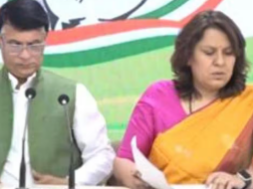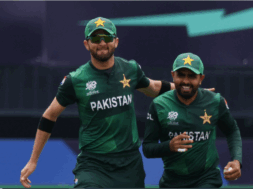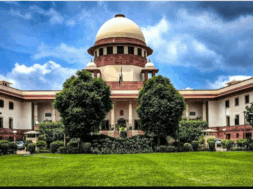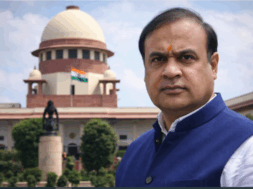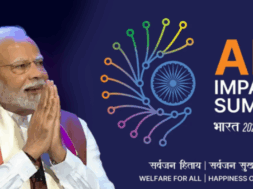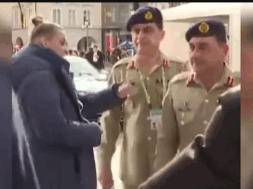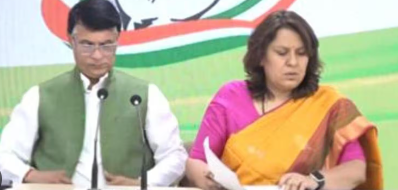
Congress Terms Consecration Ceremony of Ayodhya Ram Temple a BJP “Political Programme”
Manas Dasgupta
NEW DELHI, Jan 12: Even as the Congress and the BJP are on warpath over the Grand Old Party deciding to skip the consecration ceremony of the Ayodhya Ram Temple, a decision that the BJP said was outcome of the Congress leaders’ jealousy over the growing popularity of the Prime Minister Narendra Modi, the Congress on Friday hit back asserting that the January 22 ceremony was not a religious but the ruling party’s “political programme.”
In a strong pushback against the BJP criticism, the party’s media and publicity chief Pawan Khera and head of social media wing, Supriya Shrinate, pointed out that the Sankaracharayas of four maths/peeth (monasteries) too had declined to attend the consecration ceremony on the ground that it was being not done as per proper Hindu tradition.
Addressing a press conference at the All India Congress Committee (AICC) headquarters, Mr Khera and Ms Shrinate asked, “Is this a religious event? Is the pran pratishtha taking place under the supervision of the Sankaracharyas? All the four Sankaracharyas and the four peeths have said that consecration cannot take place in an incomplete temple. If this is not a religious event, then it’s a political one,” Mr Khera alleged.
“Do you need to be invited at all to visit your Lord? Have you ever heard a political party handing out invitations? I don’t need a middleman between me and my God,” added the Congress leader. Mr Khera claimed that the Sankaracharyas were in favour of holding consecration ceremony during Ram Navami but it was not agreed to because of “political reasons.”
“Now, the BJP is trying to divide even Sanatana Dharma,” alleged Ms Shrinate and pointed out that the leaders of the Uttar Pradesh unit of the Congress would be visiting Ayodhya on January 15 and the party hasn’t stopped anyone from visiting the temple.
Attacking the Congress on its decision for the party president Mallikarjun Kharge, former president Sonia Gandhi and the Congress leader in the Lok Sabha Adhir Ranjan Chowdhury deciding the skip the January 22 ceremony, the BJP had termed it as an example of the Opposition party’s “tendency” to boycott events that mark the “turning of a page of history” due to its feelings of “jealousy, malice and inferiority” complex regarding Modi.
“Due to its feelings of jealousy, malice and inferiority complex towards Prime Minister Narendra Modi, the Congress had gone to the extent of opposing the country and is now opposing God,” BJP spokesperson Sudhanshu Trivedi said addressing journalists at the party’s headquarters in New Delhi.
Mr Trivedi noted that Iqbal Ansari, the Muslim litigant in the land dispute case involving the temple and the Babri mosque which once stood at the spot, had also been extended an invitation, reflecting “Hinduism’s generosity.” Mr Ansari had accepted the invitation, even while the Congress chose to boycott the ceremony, Mr Trivedi said.
He claimed that it had been the Congress party’s tendency to create hurdles during historic moments for the country. “Whenever the page of history turns, the Congress, instead of standing with it, has opted to boycott,” he said, citing a host of recent events, including the inauguration of the new Parliament building, enactment of the GST, and addresses to Parliament by President Droupadi Murmu and former President Ram Nath Kovind.
Mr Trivedi rejected the Congress’ contention that the BJP and RSS had appropriated the entire inaugural event saying that there was no division among people in the temple. “It should not be linked to any organisation or ideology,” he said.
Noting that former Prime Minister Jawaharlal Nehru had opposed the association of then-President Rajendra Prasad and some Congress leaders with the rebuilding and inauguration of the Somnath temple in 1951, Mr Trivedi claimed that the Congress was continuing this Nehruvian legacy and has disowned the ‘Ram Rajya’ concept of Mahatma Gandhi.
A Congress government under Indira Gandhi had fired upon saints protesting against cow-slaughter, said the BJP spokesperson, adding that under the leadership of Sonia Gandhi, the Congress had described Lord Ram as an imaginary figure.
Responding to BJP criticism of Nehru, the Congress pointed to letters by Nehru to prove the country’s first Prime Minister did nothing of the sort that BJP leader Sudhanshu Trivedi alleged.
“Sudhanshu Trivedi has apparently waved some letters on air – of Pandit Nehru on the Somnath Temple. These and many other letters of Nehru, including to then Home Minister Rajaji and President Rajendra Prasad, are all in the public domain and form part of Vol 16-I of the Second Series of the Selected Works of Jawaharlal Nehru available online at nehruselectedworks.com,” Congress leader Jairam Ramesh said in a post on X.
“Contrary to what Trivedi claims, these constitute no great revelation. Nehru was completely transparent and left behind written records – written by him personally. Here is some correspondence on the subject that Mr Trivedi did not exhibit,” Mr Ramesh said, attaching a few pages of the documents.
Mr Trivedi had alleged Nehru opposed the association of Prasad and some Congress leaders with the rebuilding and inauguration of the Somnath temple. In Nehru’s letter of March 11, 1951, shared by the Congress, the former Prime Minister told the then Home Minister C Rajagopalachari, “I wrote to him that while there was obviously no objection to his visiting this temple or any other temple or other place of worship normally, on this particular occasion the inauguration of the temple would have a certain significance and certain implications. Therefore, for my part, I would have preferred if he did not associate himself in this way.”
“As the President is also anxious to associate himself with this function, I do not know whether it is desirable for me to insist that he should not do so. I propose, therefore, subject to your advice, to tell him that he can exercise his own discretion in the matter, although, I still think that it would be better for him not to go there,” Nehru said in the letter.
On March 13, 1951, Nehru also wrote to Prasad on his visit to the Somnath temple, saying, “… If you feel that it will not be right for you to refuse the invitation, I would not like to press my point any further.” Nehru wrote to Prasad again that his visit to Somnath temple was assuming “a certain political importance” and said he was being asked questions about it in parliament, to which he replied saying the government has nothing to do with it.
